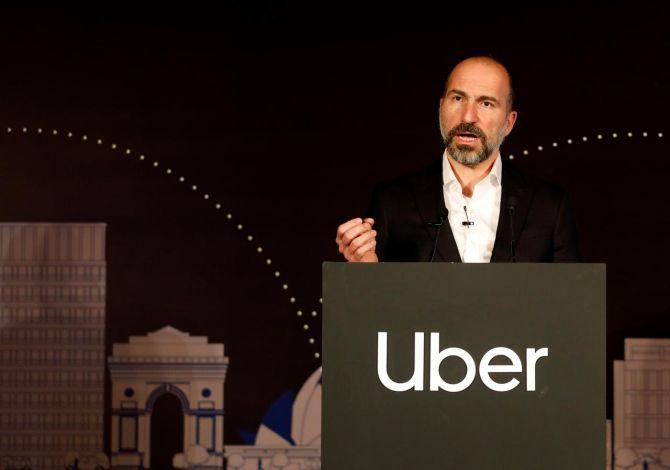Uber Chief Executive Officer (CEO) Dara Khosrowshahi sees India as one of the toughest markets and a standard to succeed in any other part of the world.

One of the biggest challenges for the ride-hailing firm, according to Khosrowshahi, is the expectation of Indian consumers for more services at lower spending.
“India is one of the toughest markets out there.
"The Indian customer is so demanding and doesn’t want to pay for anything (laughs),” Khosrowshahi told Infosys co-founder and Aadhaar architect Nandan Nilekani during a fireside chat event on Thursday in Bengaluru.
He spoke about the subject ‘Building population-scale technology’.
“India is the gateway to the world for us.
"If we succeed here, that sets the standard for us to succeed in so many other markets,” said Khosrowshahi.
Despite the challenges, Khosrowshahi said that this is the best time for Uber in India, and he is proud of the team here.
One of the biggest strategic opportunities that Uber has identified to succeed and grow in India is to expand into the low-cost segment.
The firm plans to expand its low-cost service segments, particularly two-wheeler, three-wheeler, and bus services in India.
In the past, the company had mainly focused on four-wheelers, and the core business came from the luxury sector.
“If you look now, for us, the single biggest opportunity that we are passionate about is lower-cost products; three-wheelers and two-wheelers, and we are building high-capacity vehicles like Uber bus that work for longer distances,” said Khosrowshahi.
“It is also an extraordinary opportunity for us to expand our services to a wider swathe of the population.
"We don’t just want to be an upper-middle-class product.
"We want to be available to everybody.”
Khosrowshahi also said that companies and governments around the world can learn from the scale and ambition of India’s digital public infrastructure.
He added that as a technology company, Uber views open source tech stacks with a lot of interest and recognises the opportunities they bring for everyone.
Uber India reported a 54 per cent increase in revenue at Rs 2,666 crore in the financial year ended March 2023 (2022-23).
This was driven by strong demand in its ride-hailing business and growth in the support and services functions.
Uber India's net loss during the period increased to Rs 311 crore from Rs 197 crore during 2021-22.
The firm’s business slowed down during the pandemic lockdowns in 2020 and 2021 and has since recovered.
Khosrowshahi, who arrived in the US as an Iranian refugee when he was nine years old, has a bachelor’s degree in engineering from Brown University.
He was previously the CEO of the travel firm Expedia.
He took over as CEO of Uber in 2017.
However, after the outbreak of the pandemic, the mobility business faced a huge threat.
Khosrowshahi said that Uber was losing $3 billion in terms of profits during the pandemic.
This led him to lay off employees and exit various businesses.
“We lost 85 per cent of our volumes, and that required a lot of soul-searching.
"We were a company that was completely focusing on expanding, but we had to retrench.
"It forced us to decide what is the core value of the company and what is not,” said Khosrowshahi.
The firm was in other businesses like building e-bikes and scooters, autonomous technology, vertical take-off-landing products. It had to painfully get out of those businesses.
However, the event enabled the company to double down on building large marketplaces that bring demand and supply for transportation together in a seamless way using technology.
Later, the Uber Eats business exploded as a lot of drivers moved to that division.
The company also emerged out of the pandemic.
“We went from a $3 billion burn to a $5 billion burn.
"Fortunately, we had a lot of money in the bank,” said Khosrowshahi.
He said one of the lessons for the founders is to have more capital than they think they need for any contingency.
Khosrowshahi also spoke about how he spent months undercover in 2021 as an Uber driver and delivery agent to better understand and address the problems they face.
This included ferrying riders and dropping off Uber Eats orders in San Francisco.
“During the pandemic, I was going crazy at home.
"I bought an e-bike and started delivering food. It preserved my sanity during those dark days,” said Khosrowshahi.
“After Covid was over, I bought a Tesla to do (deliveries) and it helped us to build a better product.
"The test for any great entrepreneur is not how you are doing during your best days but how you do on worst days.”
Partnership with ONDC
The company will be looking into tapping into the digital public infrastructure potential in India through platforms like ONDC (Open Network for Digital Commerce), Unified Payments Interface, DigiLocker, and Aadhaar to enable seamless mobility services in India.
Uber also formed an agreement with the government-backed ONDC to explore integration with the network to expand the range of mobility offerings on the Uber app. It would strengthen Uber’s mission of bringing safe, affordable, and reliable rides to all Indians.
“Our vision for Uber in India is to serve the mobility needs of all Indians.
"This is in line with ONDC’s objective of democratising digital commerce,” said Prabhjeet Singh, president, Uber India and South Asia.
T Koshy, managing director and CEO of ONDC said that as open network is continuously evolving, mobility, transport, and travel is certainly a critical sector.
Different players together on the network foster innovation and newer business models.
He said the agreement with Uber is a major step forward.
“We hope it will enable a diverse range of mobility solutions to benefit every Indian.”












 © 2025
© 2025